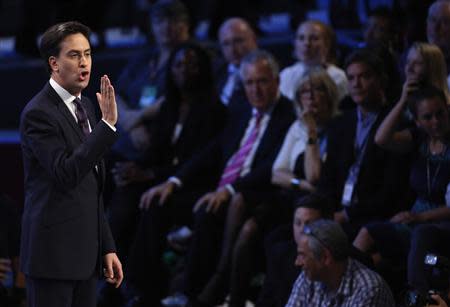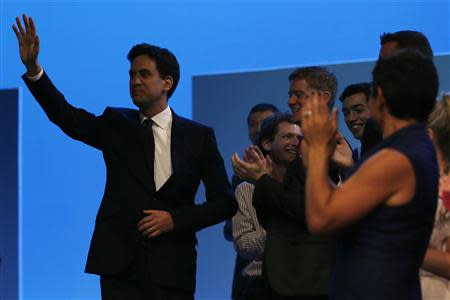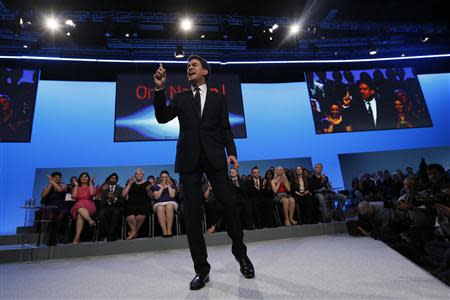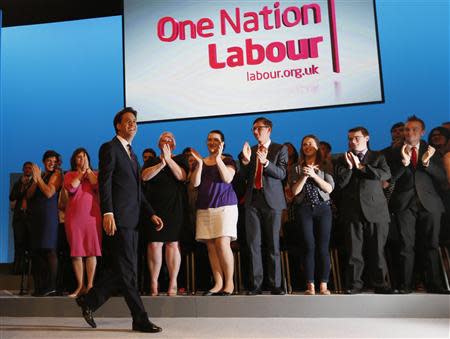Labour draws 2015 election battle lines against 'privileged few'
By Peter Griffiths and William James BRIGHTON, England (Reuters) - Britain's opposition Labour leader Ed Miliband pledged on Tuesday to end a cost of living crisis by tapping energy firms and big companies for billions of pounds, seeking to win over sceptical voters before the 2015 election. Saddled with bleak personal ratings and doubt within his own party that he can lead Britain, Miliband said Labour would help squeezed families by freezing energy bills for two years and cutting taxes for small firms if it wins in two years' time. In an attempt to restore Labour's economic reputation, he blamed Prime Minister David Cameron's cuts for delaying the recovery from the worst crisis since World War Two and for the longest fall in living standards for more than a century. Miliband spoke without notes for over an hour at a Labour conference, casting Cameron's Conservatives as the party of the privileged few. He said only Labour would help voters bruised by years of stagnation, public cuts and weak wage growth. "The cost of living crisis isn't an accident of David Cameron's economic policy: it is his economic policy," Miliband said to huge applause from delegates in the south coast seaside resort of Brighton. "Unless we put things right, it will only be a recovery for the few." Standing on a triangular stage with no lectern, surrounded on all sides by activists, Miliband accused Cameron - who was educated at Britain's most exclusive school - of running a "race to the bottom", with low wages and weak employment rights. Echoing former U.S. president Ronald Reagan's phrase in his 1980 White House campaign, Miliband asked voters "are you better off now than you were five years ago?". His energy bill freeze would cost major energy companies 4.5 billion pounds. Miliband, who has faced criticism from some party opponents for perceived lacklustre leadership, strolled through a cheering audience with his wife Justine, hugging and kissing supporters as a dance track called "Lifted" boomed out. POOR RATINGS Labour, leading the Conservatives in the polls, lost power in 2010 after its second worst election defeat since 1918. But the public's view of Miliband is worse than that of the party. A ComRes poll for ITV News showed 49 percent of voters think Labour would have a better chance of winning the election without Miliband as leader, while only 19 percent disagreed. A separate survey for research company YouGov this month suggested only 3 percent of voters saw Miliband as a natural leader, compared to 14 percent for Cameron, who was also seen as stronger, more decisive and better in a crisis. Tackling his critics, Miliband said he would "relish a debate" with Cameron over their leadership and character. Miliband, 43, whose Marxist father escaped the Nazis in Belgium by catching one of the last boats to Britain in 1940, beat his older brother - David Miliband, a former foreign minister - to the party leadership in 2010. Supporters say Miliband is a strong figure who united his party after years of feuding, blocked Cameron's support for military action in Syria and had the courage to stand up to media tycoons such as Rupert Murdoch. Detractors, however, dismiss him as "Red Ed", a left-wing figure who lacks gravitas, struggles to convey his beliefs and whose style alienates voters. One of Miliband's biggest obstacles is the message from polls that voters have more faith in the Conservatives to run the world's sixth biggest economy. Signs of a surprisingly strong recovery have allowed the government to say it has won the economic argument. (Editing by Alison Williams, Guy Faulconbridge)





